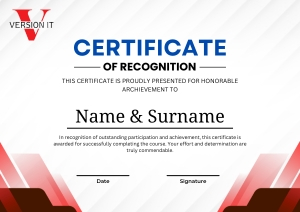Home > Courses > Full Stack Courses > Dot Net Full Stack > c#.net Course
C++ Training in Hyderabad
C++ is a robust and versatile language, playing a pivotal role in the creation of cutting-edge technologies like game engines, web browsers, operating systems, and financial platforms. Bjarne Stroustrup developed it as an advanced version of the C language. Renowned for its efficiency, C++ is widely employed to develop high-performance applications while offering precise control over memory and system resources.
25 Modules
with Certifications
Certificate
After Completion
English
Language
Are you aspiring to master one of the most powerful and versatile programming languages in the industry? Version IT offers top-tier C++ training in Hyderabad, meticulously designed to transform beginners into proficient C++ developers. Recognized as one of the best institutes for C++ in Hyderabad, we provide a learning environment that fosters growth, innovation, and excellence. Whether you’re aiming to enhance your career prospects or delve into complex software development, our C++ course in Hyderabad is your gateway to success.
Our C++ training in Hyderabad at Version IT is structured to provide a comprehensive understanding of the C++ programming language, from its foundational concepts to advanced features. This course is ideal for individuals seeking to build a strong programming base and those aiming to specialize in areas requiring high-performance applications.
Teaching Methodology:
Interactive Lectures: Engaging sessions that simplify complex concepts.
Hands-On Coding: Practical exercises to reinforce learning.
Project-Based Learning: Real-world projects to apply theoretical knowledge.
Regular Assessments: Quizzes and assignments to track progress.
Personalized Support: One-on-one mentorship and doubt-clearing sessions.
Version IT, The Best C++ training institutes in Hyderabad ensure that every student not only learns but also applies their knowledge effectively, preparing them for the dynamic demands of the IT industry.
Learning Objectives
The primary goal of our C++ course in Hyderabad is to equip students with a deep understanding and practical proficiency in C++ programming. After completing the course, you will learn the skills to:
- Understand the key principles, syntax, and semantics that form the foundation of C++.
- Develop efficient and optimized code using best practices.
- Design and implement robust object-oriented systems.
- Utilize inheritance, polymorphism, and other OOP principles effectively.
- Handle dynamic memory management and pointer arithmetic.
- Leverage templates and STL for generic programming and data manipulation.
- Apply algorithmic thinking to solve real-world programming challenges.
- Optimize code for performance and scalability.
- Develop complete applications from scratch, encompassing all stages of the software development lifecycle.
- Collaborate on projects that simulate industry scenarios.
- Gain the skills necessary for roles such as software developer, systems engineer, and game developer.
- Enhance your problem-solving and critical-thinking abilities to excel in technical interviews.
- Gain a deep understanding of the advancements in C++11, C++14, C++17, and C++20, and learn how to leverage them in your projects.
- Write clean, efficient, and modern C++ code adhering to the latest standards.
Our C++ training in Hyderabad is designed to ensure that you not only learn the language but also understand how to apply it in various domains, making you a versatile and valuable asset in the job market.
Audience
Our C++ training institutes in Hyderabad cater to a diverse range of individuals looking to enhance their programming skills. Whether you’re a novice or an experienced developer, our C++ course in Hyderabad is tailored to meet your specific needs.
Who Should Enroll in Our C++ Course:
- Undergraduate and postgraduate
- Individuals aiming to supplement their academic knowledge with practical programming skills.
- IT professionals looking to transition into roles that require expertise in C++.
- Individuals passionate about programming and software development.
- Aspiring game developers and system programmers interested in C++.
- Professionals from non-technical backgrounds aiming to enter the IT industry.
- Individuals seeking to upskill and enhance their employability in competitive job markets.
Advantages of Learning C++ Course
Enrolling in our C++ course in Hyderabad at Version IT opens up a multitude of advantages that can significantly enhance your career and technical prowess. Here are the key benefits of mastering C++ through our comprehensive training program:
- High Performance and Efficiency
C++ is renowned for its performance-oriented nature. It allows developers to write highly efficient code that can run close to the hardware level, making it ideal for applications where speed and resource management are critical. By learning C++, you gain the ability to develop applications that are both fast and reliable.
- Object-Oriented Programming (OOP) Paradigm
C++ is built around the principles of Object-Oriented Programming, which promotes modularity, reusability, and scalability. Understanding OOP through C++ equips you with the skills to design complex software systems that are easier to maintain and extend over time.
- Versatility Across Various Domains
C++ is a flexible programming language applied across a wide range of industries, including:
Software Development: Building desktop applications, system software, and utilities.
Game Development: Creating high-performance games and graphics engines.
Embedded Systems: Developing firmware and software for embedded devices.
Financial Services: Designing trading systems and financial modeling applications.
Healthcare Technology: Building applications for medical equipment and health system management.
Automotive Industry: Developing software for vehicle control systems and autonomous driving technologies.
This versatility ensures that C++ skills are in high demand across multiple industries, providing you with a wide range of career opportunities.
Career Advancement and Higher Earning Potential
Proficiency in C++ is highly sought after in the job market. Companies value developers who can write efficient, high-performance code, and are willing to offer competitive salaries to attract and retain such talent. By learning C++, you position yourself for advanced roles and better compensation packages.
Topics You will Learn
Basics
- Introduction to C++
- Different paradigms of problem solving
- POP vs OOP
- Features of Object Oriented Programming Languages
- Object
- Class
- Abstraction
- Encapsulation
- Inheritance
- Polymorphism
- Dynamic Binding
- Message Communication
- Constants
- Variables
- Keywords
- Data types
- Declaration of Variables
- Output Stream (cout) & Manipulators
- Input Stream (cin)
- Comments
- Operators
- Arithmetic operators
- Relational operators
- Logical operators
- Assignment operators & compound assessment operations
- Increment & decrement operators
- Conditional operators
- Bitwise operators
- Shift operators
- Type casting
- Compound assignment operators
- Address operators
- Comma operator
- Pointer operator
- Sizeof operator
- new operator
- delete operator
- Control Statements
- Conditional Control Statements
- If, if-else
- nested if-else, if-else-if ladder
- Multiple Branching Control Structure
- switch-case
- Loop Control statements
- while
- do-while
- for
- Nested Loops
- Jump Control structures
- break
- continue
- goto
- return
- Arrays
- Strings
- Structures
- Pointers
- Dynamic memory allocation using new and delete
Functions
- Defining a Function
- Calling a Function
- Return statement
- Function Prototype
- Basic Function Designs
- Scope
- Reference variables
- Recursion
- Parameter Passing Methods
- Call by value
- Call by address
- Call by reference
- Function Overloading
- Default Arguments
- Inline Functions
Classes and Objects
- Defining a Class
- Creating Objects
- Access specifiers
- Accessing Class Members
- Scope Resolution Operator ( :: )
- Defining Member Functions
- Outside the class
- Inside the class
- Member function with argument
- This pointer
- Passing Objects as Arguments
- Returning Objects
- Array of objects
- Pointer to object
- Dynamic objects
- Friend Functions
- Friend Class
- Composition
- Container class
- Contained class
- Programs
- Student Class
- Employee Class
- Complex Class
- Matrix Class
- Rational Class
- Circle Class
- Rectangle Class
- Composition
Constructors & Destructors
- Constructors
- Properties of constructors
- Types of constructors
- Default Constructors
- Parameterized Constructors
- Copy Constructors
- Constructor Overloading
- Constructors with Default Arguments
- Destructors
- Differences between Member functions & Constructors
- Differences between Constructors & Destructors
- Static Data Members
- Static member functions
- Constant data members
- Constant Member Functions
Operator Overloading
- Defining Operator Overloading Function
- Overloading Unary Operators
- Overloading Binary Operators
- Overloading Unary Operators using Friend Functions
- Overloading Binary Operators using Friend Functions
- Overloading << & >>
- Programs
Inheritance
- Class hierarchies
- Base classes
- Derived Classes
- Derived Class Definition
- Access specifier : protected
- Types of Inheritance & Programs
- Single inheritance
- Multiple inheritance
- Hierarchical inheritance
- Multi-level inheritance
- Hybrid inheritance
- Multi-path inheritance
- Constructors in Derived Classes
- Destructors in Derived Classes
Polymorphism and Virtual Functions
- Static Binding
- Dynamic Binding
- Virtual Destructor
- Function Overriding
- Accessing Members using Pointers
- Virtual Functions
- Pure Virtual Functions
- Abstract Classes
- Virtual Destructors
Templates
- Introduction
- Advantages
- Function Templates
- Over loading function template
- Class Templates
- Inheritance Class Templates
Exception Handling
- Types of Errors
- Benefits of exception handling
- try, catch, throw keywords
- Throwing an exception
- ‘try’ block
- Catching an exception
- Exception objects
- Rethrowing an exception
- Exception Handling Mechanism
- Catching all exceptions
- Nested try blocks
Files
- File Streams Classes
- Opening & Closing a File
- Detection End of File
- File Pointers & Their Manipulation
- Sequential Files
- Random Access Files
I-O Streams
- I-O stream Class hierarchies
- Unformatted I-O Operation
- get(), put(), getline()
- write()
- in cout
- cin
- Formatted I-O Operations
- width(), precision()
- fill(), setf()
- unsetf()
- Manipulators
- Manipulator operators
- Endl, ends
- manipulator functions
- setw(), setfill()
- setprecision()
- setiosflags()
- setbase()
- resetiosflags()
- User defined manipulators
- Operator and Overloading
- Manipulator operators
Standard Template Libraries
- Containers
- vector
- list, deque
- arrays
- forward_list
- queue
- priority_queue
- stack
- set, multiset
- map, multimap
- Algorithms
- Sorting, Searching
- Important STL Algorithms
- Useful Array algorithms
- Partition Operations
- Iterators
Let Your Certificates Speak

- Receive a certificate upon successful completion of the course, validating your C++ skills to potential employers.
- Opportunity to take certification exams that demonstrate your proficiency in C++.
- Certificates of completion are given out after the training.
All You Need to Start this Course
- Basic understanding on software applications.
- Understanding of file management and basic command-line operations.
- Basic knowledge of programming concepts such as variables, control structures, and data types can be advantageous.
- Experience with any programming language (e.g., Python, Java, or C) can provide a smoother transition into C++.
- A fundamental understanding of mathematics, including algebra and basic logic, is helpful for grasping programming concepts and algorithms.
- Ability to approach problems logically and systematically.
- Willingness to engage in analytical thinking and troubleshoot code effectively.
- If you are an absolute beginner with no prior programming experience, Version IT offers preparatory modules to get you up to speed before diving into the core C++ curriculum.
Testimonials




Still Having Doubts?
Choose from short-term intensive courses or extended programs that fit your learning pace.
Options for weekday, weekend, and evening batches to accommodate your schedule.
Suitable for all skill levels, from beginners to advanced programmers.
Organized into modules that progressively build your knowledge and skills.
Interactive and engaging sessions with face-to-face interaction.
Access to virtual classrooms, recorded lectures, and online resources for remote learning.
Receive a certificate upon successful completion of the course, validating your C++ skills to potential employers.
Opportunity to take certification exams that demonstrate your proficiency in C++.
Work on projects that simulate industry scenarios, enhancing your practical experience.
Assignments designed to reinforce learning and assess your progress.
Access to mentors who provide guidance and support throughout the course.
Access to books, online resources, and reference guides.
Revisit lectures anytime with our extensive library of recorded sessions.


